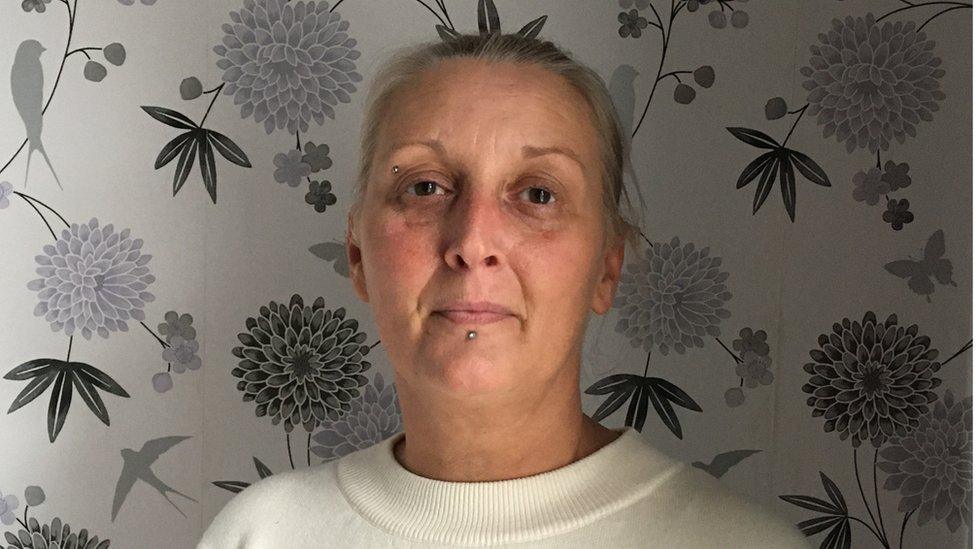Britain's 'unprecedented' drug shortage
- Published

Michele Reynolds Cole has to ration her epilepsy drugs due to shortages
"You know when your washing machine first starts spinning and then it goes really fast to get hot - I feel like I'm on a superfast spin."
Michele Reynolds Cole, from Rochdale in Greater Manchester, is telling me what it's like to live without Gabitril, the drug she's used for eight years to reduce the intensity and the frequency of her seizures, which normally occur around once a week.
"My little jerking movements have started to come back and I'm just waiting for the next fit really."
When I first met her in early October, Michele had already become used to eking out her tablets, taking just one a day instead of the two she'd been prescribed, because her pharmacist had run short.
A couple of weeks later they were out of stock altogether, and she was becoming extremely anxious.
Without Gabitril, she suffered sharp involuntary spasms which meant she was a danger to herself and others when handling hot food or drinks.
She was also at risk of death or serious injury because she could hit her head while falling during a fit, and needed round-the-clock care, either from her elderly mother Pam or her 20-year old daughter Lily.
"I've rung pharmacies, manufacturers, I've found an unlicensed company online, I've even rung America" she said, describing her desperate pursuit of Gabitril.
"I don't understand why I can't get my drug.
"Does someone have to die from having a seizure before someone takes notice?"
'Life-changing consequences'
For some conditions, substituting one drug for another is relatively straightforward, but with epilepsy, even a slight change in medication can have devastating consequences.
Clare Pelham from the Epilepsy Society explained: "People will be familiar with headache tablets, where you can take one, or another, and they'd both work.
"It's not the same with epilepsy drugs. That small switch may mean you may get a breakthrough seizure, and it just takes one for you to lose your driving licence.
"Many people need their licence, for school or work. So just that small switch can have life-changing consequences."
Epilepsy is just one of a number of conditions for which patients sometimes struggle to obtain medication.
GPs, pharmacists and doctors working in acute care, have all told us that the current shortage of prescribed medicines and treatments is "unprecedented".
Last month, the government banned the export of all Hormone Replacement Therapy treatments, used to counter the distressing effects of the menopause, amid reports that women struggling with the condition were having to source supplies abroad.
Leaked document
File on 4 has seen a leaked 24-page document circulated to doctors last week from the medicine supply team at the Department of Health and Social Care.
It reveals the NHS is running short of dozens of life-saving medicines - including treatments for cancer, heart conditions, Parkinson's Disease and mental health problems.
Patients like Michele, who have epilepsy, are among the worst-affected.
Her distress at being unable to obtain her usual prescription was compounded by her frustration at not knowing why Gabatril was unavailable, beyond vague reports of a "manufacturing problem."
The Department of Health and Social Care says it understands the concerns around availability of medicines and is "doing everything it can to ensure patients have access to safe and effective treatments."
A spokesperson told the “óĻó“«Ć½ the department "works closely with partners and industry to help prevent shortages and resolve any issues as soon as possible."
Global shortages
File On 4 was able to establish that the company which makes Gabatril for the UK licence holder Teva, had production difficulties arising from a new packaging directive designed to prevent fake medication entering the UK market.
It's an example of how the global supply chain of the modern pharmaceutical industry, where manufacturing and the acquisition of raw materials is spread around the world, has become ever more susceptible to disruption.
It's not only the UK that's affected. Shortages have also been reported in the United States and in a number of European countries including Poland, Denmark and Germany.
The upside to the globalisation is that it's helped drive down the price of drugs, especially in the UK, where the NHS can take advantage of its bulk purchasing power.
The Healthcare Distribution Association, which represents the main UK wholesalers, is planning to start distribution of a leaflet next month to all 16,000 UK pharmacists, explaining the myriad factors in the supply chain.
It lists many of the potential problems which can have an impact on the supply chain, including IT failure, stockpiling of drugs by speculators, changes in regulation and sudden outbreaks of disease.
Thankfully for Michele, her supply issue was finally resolved last week, and her stock of Gabitril has been replenished.
"Relief is an understatement" she said.
"I could cry just with sheer relief that for now the situation is over".
You can hear more on 'File on 4: Drug Shortages' at 8pm on Tuesday 19 November on Radio 4 - and catch up later on “óĻó“«Ć½ Sounds.